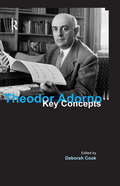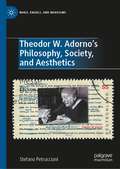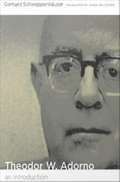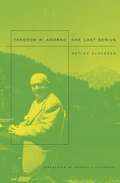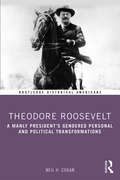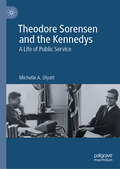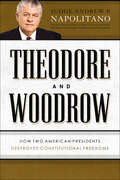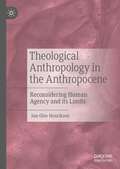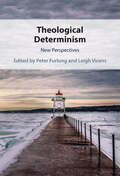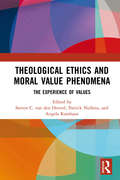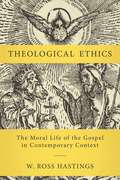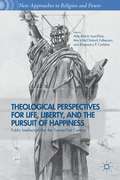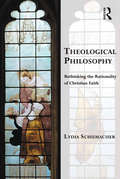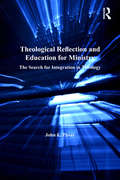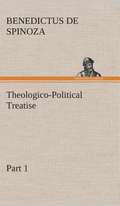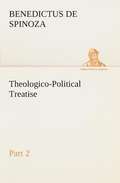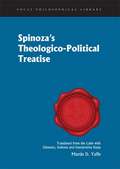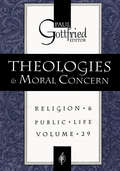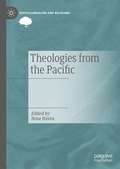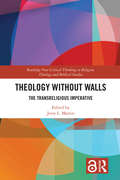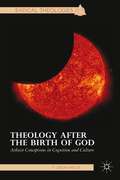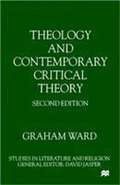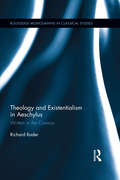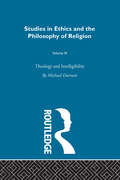- Table View
- List View
Theodor Adorno: Key Concepts (Key Concepts)
by Deborah CookAdorno continues to have an impact on disciplines as diverse as philosophy, sociology, psychology, cultural studies, musicology and literary theory. An uncompromising critic, even as Adorno contests many of the premises of the philosophical tradition, he also reinvigorates that tradition in his concerted attempt to stem or to reverse potentially catastrophic tendencies in the West. This book serves as a guide through the intricate labyrinth of Adorno's work. Expert contributors make Adorno accessible to a new generation of readers without simplifying his thought. They provide readers with the key concepts needed to decipher Adorno's often daunting books and essays.
Theodor W. Adorno's Philosophy, Society, and Aesthetics (Marx, Engels, and Marxisms)
by Stefano PetruccianiThis book is a complete presentation of the most important themes of Theodor W. Adorno’s critical theory, and of its relevance for the understanding of the modern society. After an Introduction, which traces Adorno’s biographical and intellectual profile, the book is structured in three parts. The first is devoted to theoretical philosophy, and in particular to the concepts of philosophy, negative dialectics and metaphysics, and his aim is to clarify the Adornian understanding of such difficult concepts. The second is devoted to the main themes of Adorno’s social theory: the concept of domination, the relationship with Marxism, the theory of the decay of the individual, the critique of mass manipulation. The third part is devoted to aesthetics and culture criticism, and entails a conclusion in which the author outlines a confrontation between the Adornian and the Habermasian critique of modernity.
Theodor W. Adorno: An Introduction
by Gerhard SchweppenhauserTheodor W. Adorno (1903-1969) was one of the twentieth century's most important thinkers. In light of two pivotal developments--the rise of fascism, which culminated in the Holocaust, and the standardization of popular culture as a commodity indispensable to contemporary capitalism--Adorno sought to evaluate and synthesize the essential insights of Western philosophy by revisiting the ethical and sociological arguments of his predecessors: Kant, Nietzsche, Hegel, and Marx. This book, first published in Germany in 1996, provides a succinct introduction to Adorno's challenging and far-reaching thought. Gerhard Schweppenhuser, a leading authority on the Frankfurt School of critical theory, explains Adorno's epistemology, social and political philosophy, aesthetics, and theory of culture. After providing a brief overview of Adorno's life, Schweppenhuser turns to the theorist's core philosophical concepts, including post-Kantian critique, determinate negation, and the primacy of the object, as well as his view of the Enlightenment as a code for world domination, his diagnosis of modern mass culture as a program of social control, and his understanding of modernist aesthetics as a challenge to conceive an alternative politics. Along the way, Schweppenhuser illuminates the works widely considered Adorno's most important achievements: Minima Moralia, Dialectic of Enlightenment (co-authored with Horkheimer), and Negative Dialectics. Adorno wrote much of the first two of these during his years in California (1938-49), where he lived near Arnold Schoenberg and Thomas Mann, whom he assisted with the musical aesthetics at the center of Mann's novel Doctor Faustus.
Theodor W. Adorno: One Last Genius
by Rodney Livingstone Detlev ClaussenHe was famously hostile to biography as a literary form, yet this life of Adorno by one of his last students gives us a clear look at how the man and his moment came together to create 'critical theory'. The book is also a window onto the cultural ferment of Adorno's day.
Theodore Roosevelt: A Manly President’s Gendered Personal and Political Transformations (Routledge Historical Americans)
by Neil H CoganTheodore Roosevelt explores the personal and political life of the 26th President of the United States. It considers among other things his "manliness," a gendered framework of traits for the Gilded Age and Progressive Period guiding him and other men in business, politics, and war, and shows how the development of these traits transformed Roosevelt’s personal and political decisions. The work covers a storied personal life and emphasizes mental and physical challenges from depression, asthma, partial blindness, and attempted assassination. Cogan addresses the political transformation from traditional, to "Square Deal" Republican, to "Bull Moose" Progressive. The text also reviews initiatives dismissing corrupt officials, closing saloons, and arresting pimps; busting monopolies and bettering workplaces and consumer products; and conserving wildlife and natural resources. Contrary to popular conception, Roosevelt’s manliness was not macho masculinity. Rather, it was an evolving framework of traits, including courage, service, and Christian morality. Supported by a series of intriguing primary source documents, this book is essential reading for understanding Roosevelt, his era, and his manliness. It is an accessible tool for students studying and instructors teaching courses on the Gilded Age and Progressive Period in American history.
Theodore Sorensen and the Kennedys: A Life of Public Service
by Michelle A. UlyattOf the hundreds of books written about John F. Kennedy, none have yet taken the full measure of the role that Theodore Sorensen played in shaping his presidency. Serving as President Kennedy’s speechwriter from 1952 until 1963, Sorensen was a key advisor in the White House and a gatekeeper of the Kennedy legacy in the years after his assassination. This book presents a compelling portrait of Sorensen’s life and place in the American political landscape. He became an outspoken critic of corruption in politics, a vocal opponent of the militarist foreign policy approach that successive administrations adopted, and an advisor to Democratic presidential candidates such as Robert F. Kennedy and Barack Obama. Taking up questions about the role of presidential advisors and the concept of public service, an ideal that was central to the most famous of the speeches that Sorensen wrote for President Kennedy, Michelle A. Ulyatt offers new insight into Sorensen’s influence on the Kennedy years and the generation of leaders who came after.
Theodore and Woodrow: How Two American Presidents Destroyed Constitutional Freedom
by Andrew P. NapolitanoThe New York Times–bestselling author and Fox News judicial analyst examines the effects of two US presidents on personal freedom.“Either the Constitution means what it says, or it doesn’t.”America’s founding fathers saw freedom as a part of our nature to be protected—not to be usurped by the federal government—and so enshrined separation of powers and guarantees of freedom in the Constitution and the Bill of Rights. But a little over a hundred years after America’s founding, those God-given rights were laid siege by two presidents caring more about the advancement of progressive, redistributionist ideology than the principles on which America was founded.Theodore and Woodrow is Judge Andrew P. Napolitano’s shocking historical account of how a Republican and a Democratic president oversaw the greatest shift in power in American history, from a land built on the belief that authority should be left to the individuals and the states to a bloated, far-reaching federal bureaucracy, continuing to grow and consume power each day.With lessons rooted in history, Judge Napolitano shows the intellectually arrogant, anti-personal freedom, even racist progressive philosophy driving these men to poison the American system of government. And Americans still pay for their legacy—in the federal income, in state-prescribed compulsory education, in the Federal Reserve, in perpetual wars, and in the constant encroachment of a government that coddles special interests and discourages true competition in the marketplace.With his attention to detail, deep constitutional knowledge, and unwavering adherence to truth telling, Judge Napolitano moves through the history of these men and their times in office to show how American values and the Constitution were sadly set aside, leaving personal freedom as a shadow of its former self, in the grip of an insidious, Nanny state, progressive ideology.
Theological Anthropology in the Anthropocene: Reconsidering Human Agency and its Limits
by Jan-Olav HenriksenThe Anthropocene presents theology, and especially theological anthropology, with unprecedented challenges. There are no immediately available resources in the theological tradition that reflect directly on such experiences. Accordingly, the situation calls for contextually based theological reflection of what it means to be human under such circumstances. This book discusses the main elements in theological anthropology in light of the fundamental points: a) that theological anthropology needs to be articulated with reference to, and informed by, the concrete historical circumstances in which humanity presently finds itself, and b) that the notion of the Anthropocene can be used as a heuristic tool to describe important traits and conditions that call for a response by humanity, and which entail the need for a renewal of what a Christian self-understanding means. Jan-Olav Henriksen explores what such a response entails from the point of view of contemporary theological anthropology and discusses selected topics that can contribute to a contextually based position.
Theological Determinism: New Perspectives
by Peter Furlong Leigh VicensThis volume unites established authors and rising young voices in philosophical theology and philosophy of religion to offer the single most wide-ranging examination of theological determinism-in terms of both authors represented and issues investigated-published to date. Fifteen contributors present discussions about theological (or divine) determinism, the view that God determines everything that occurs in the world. Some authors provide arguments in favor of this position, while others provide considerations against it. Many contributors investigate the relationship between theological determinism and other philosophical issues (the principle of sufficient reason; the compatibility of determinism and free will; moral luck), theological doctrines (creation ex nihilo; divine forgiveness; the inevitability of sin; the unity of Christ's will with God's), or moral attitudes and practices (trusting God; resenting the ill-will of others; resisting evil). This book is essential reading for all those interested in the relationship between theological determinism and philosophical thought.
Theological Ethics and Moral Value Phenomena: The Experience of Values
by Patrick Nullens Angela Roothaan Steven C. Van Den HeuvelThe experience of moral values is often side-lined in discussions about moral reasoning, and yet our values define a large part of our moral motives, standards and expectations. Theological Ethics and Moral Value Phenomena explores whether the experience of a meeting point of the immanent and the transcendent, i.e. the moral self and God, can be the source of our values. The book starts by arguing for a greater theological engagement with value ethics, personalism and the phenomenological method by drawing on thinkers such as Max Scheler and William James. It then provides an understanding of the social and religious dimension of the valuing person, demonstrating the importance of the emotional, as well as the cognitive, dimension of value experience. Finally, this value perspective is utilised to engage with current moral issues such as professional ethics, environmental ethics, economical ethics and family ethics. Integrating the concepts of religious experience, moral motivation, and subjective and objective value within a broad framework of Christian theology and philosophy, this is vital reading for any scholar of Theology and Philosophy with an interest in ethics and moral reasoning.
Theological Ethics: The Moral Life of the Gospel in Contemporary Context
by W. Ross HastingsBe Prepared to Think Theologically through Today's Most Pressing Ethical and Moral Issues In Theological Ethics theologian, pastor, and ethicist W. Ross Hastings gives pastors, ministry leaders, and students a guide designed to equip them to think deeply and theologically about the moral formation of persons in our communities, about ethical inquiry and action, and about the tone and content of our engagement in the public square. The book presents a biblical perspective and a gospel-centered framework for thinking about complex contemporary issues in ways are life-giving and that will lead readers into greater flourishing as human persons in community.This book is distinctive in presenting:A framework for theological ethics that is robustly theological and Trinitarian. Ethics isolated from the gospel and theology becomes bad news, but when it is informed by and empowered by participation in the triune God of grace, it is part of the good news of the gospel.An approach to theology and theological ethics that makes the Word of God the ultimate authority and it is therefore grounded in the biblical narrative and texts.An understanding that theological ethics are inherently missional. The church as the image of the triune God makes it the home of ethics, but in light of its missional identity, it will reverberate outwards to engage the world in ways that are humble and not power-mongering, that are gospel-based and shalom-evoking. Theological Ethics is for those who lead churches or ministries (or someday will) and who urgently need deep theological grounding as they daily encounter ethical and moral issues where they need to provide a gracious, truthful, and gospel-directed response.X
Theological Perspectives For Life, Liberty, And The Pursuit Of Happiness
by Ada María Isasi-díaz Mary Mcclintock Fulkerson Rosemary P. CarbineRather than wield religion as a weapon or a ruse in irrational appeals, the book attempts to reimagine a shared American mythos and ethos, by reminding us of our shared stake in creating an America committed to the life of all peoples and species and to the full developments of our capabilities as an exercise of liberty.
Theological Philosophy: Rethinking the Rationality of Christian Faith (Transcending Boundaries in Philosophy and Theology)
by Lydia SchumacherFor much of the modern period, theologians and philosophers of religion have struggled with the problem of proving that it is rational to believe in God. Drawing on the thought of Thomas Aquinas, Theological Philosophy seeks to overturn the longstanding problem of proving faith's rationality and to establish instead that rationality requires to be explained by appeals to faith. Building on a constructive argument developed in a companion book, Rationality as Virtue, Lydia Schumacher advances the conclusion that belief in the God of Christian faith provides an exceptionally robust rationale for rationality and is as such intrinsically rational. At the same time, Schumacher overcomes a common tendency to separate spiritual from ordinary life, and construes the latter as the locus of proof for the rationality of Christian faith.
Theological Reflection and Education for Ministry: The Search for Integration in Theology (Explorations in Practical, Pastoral and Empirical Theology)
by John E. PaverA major and continuing problem for theological education and the practice of Christian ministry is how to best achieve a genuine integration between theory and practice, theology and experience. The key claim of this book is that theological reflection, beginning with experience, is a method of integration and that pastoral supervision is a vehicle for theological reflection. In establishing this claim, John Paver demonstrates that the model and method have potential to be a catalyst for reform within theological colleges and seminaries. Three different theological reflection models are developed and critiqued in this book, and their capacity to be developed in particular contexts is explored. This book does not stop at ministry, cultural and personal integration, but is bold enough to make recommendations for structural integration within the theological institution.
Theological-Political Treatise
by Michael Silverthorne Benedict De Spinoza Jonathan IsraelSpinoza's Theological-Political Treatise (1670) is one of the most important philosophical works of the early modern period. In it Spinoza discusses at length the historical circumstances of the composition and transmission of the Bible, demonstrating the fallibility of both its authors and its interpreters. He argues that free enquiry is not only consistent with the security and prosperity of a state but actually essential to them, and that such freedom flourishes best in a democratic and republican state in which individuals are left free while religious organizations are subordinated to the secular power. His Treatise has profoundly influenced the subsequent history of political thought, Enlightenment 'clandestine' or radical philosophy, Bible hermeneutics, and textual criticism more generally. It is presented here in a new translation of great clarity and accuracy by Michael Silverthorne and Jonathan Israel, with a substantial historical and philosophical introduction by Jonathan Israel.
Theologico-political Treatise
by Benedictus De Spinoza Baruch Spinoza Martin D. YaffeA complete translation in English of this modern text, with substantive apparatus to allow the student and serious reader to grapple in a meaningful way with this seminal text. The text includes ample footnotes, Spinoza’s annotations, an interpretative essay, glossary and other indices. <p><p> Focus Philosophical Library translations are close to and are non-interpretative of the original text, with the notes and a glossary intending to provide the reader with some sense of the terms and the concepts as they were understood by Spinoza’s immediate audience.
Theologies and Moral Concern
by Paul GottfriedThis is the twenty-ninth volume in This World, a series on religion and public affairs. It focuses on theological and moral questions of deep significance for our time. The lines of division separating secular and religious outlooks, modernity and postmodernism, and romantic and classical styles of thought are some of the topics treated in this volume. Additional features are an exchange of opinions and a position paper intended to generate further discussion. This ongoing series of volumes seeks to provide a wide-ranging forum for differing views on religious and ethical considerations.Theologies and Moral Concern include the following major contributions: "Distinctions of Power: How Church and State Divide America" by Brian Mitchell; "Beyond the Impasses: Making Moral Sense of Abortion" by Anthony Matteo; "Are Religions Ever Traditional" by Jacob Neusner; "Philosophical Issues in Darwinian Theory" by Kenneth T. Gallagher; "Monotheism and Skepticism" by Aryeh Botwinick; "Defining Romantic Theology" by Gerhard Spiegler; and "The YMCA and Suburban America" by Clifford Putney. In addition, the volume features a dialogue between Michael A. Weinstein and Paul Gottfried on what constitutes the proper role for liberal arts education in contemporary American society as well as a position paper titled "The Pitfalls of Political Correctness" by Lawrence Nannery.Theologies and Moral Concern is part of an annual survey of religion and public life which aims to provide relevant information and ideas about significant issues of the day. It is directly pertinent to understanding the connection between religion and the state. This particular volume, coming at a time of intense public scrutiny of fundamentalism, evangelicism, and new religious movements generally, should have special appeal for political scientists, American studies specialists, sociologists, and those involved in the creation of public policy.
Theologies from the Pacific (Postcolonialism and Religions)
by Jione HaveaThis book offers engagements with topics in mainline theology that concern the lifelines in and of the Pacific (Pasifika). The essays are grouped into three clusters. The first, Roots, explores the many roots from which theologies in and of Pasifika grow – sea and (is)land, Christian teachings and scriptures, native traditions and island ways. The second, Reads, presents theologies informed and inspired by readings of written and oral texts, missionary traps and propaganda, and teachings and practices of local churches. The final cluster, Routes, places Pasifika theologies upon the waters so that they may navigate and voyage. The ‘amanaki (hope) of this work is in keeping talanoa (dialogue) going, in pushing back tendencies to wedge the theologies in and of Pasifika, and in putting native wisdom upon the waters. As these Christian and native theologies voyage, they chart Pasifika’s sea of theologies.
Theology Without Walls: The Transreligious Imperative (Routledge New Critical Thinking in Religion, Theology and Biblical Studies)
by Jerry L. MartinThinking about ultimate reality is becoming increasingly transreligious. This transreligious turn follows inevitably from the discovery of divine truths in multiple traditions. Global communications bring the full range of religious ideas and practices to anyone with access to the internet. Moreover, the growth of the "nones" and those who describe themselves as "spiritual but not religious" creates a pressing need for theological thinking not bound by prescribed doctrines and fixed rituals. This book responds to this vital need. The chapters in this volume each examine the claim that if the aim of theology is to know and articulate all we can about the divine reality, and if revelations, enlightenments, and insights into that reality are not limited to a single tradition, then what is called for is a theology without confessional restrictions. In other words, a Theology Without Walls. To ground the project in examples, the volume provides emerging models of transreligious inquiry. It also includes sympathetic critics who raise valid concerns that such a theology must face. This is a book that will be of urgent interest to theologians, religious studies scholars, and philosophers of religion. It will be especially suitable for those interested in comparative theology, inter-religious and interfaith understanding, new trends in constructive theology, normative religious studies, and global philosophy of religion.
Theology after the Birth of God
by F. Leron ShultsEngaging recent developments within the bio-cultural study of religion, Shults unveils the evolved cognitive and coalitional mechanisms by which god-conceptions are engendered in minds and nurtured in societies. He discovers and attempts to liberate a radically atheist trajectory that has long been suppressed within the discipline of theology.
Theology and Contemporary Critical Theory (2nd edition)
by Graham WardWard (theology and literary theory, Cambridge U.) explores how the critical theory of such postmodern thinkers as Foucault, and Derrida has changed the context of the academic study of theology and challenges it and demands its transformation. He discusses theology in relation to representation, history, ethics, aesthetics. He also suggests some directions for the discipline during post-modernity.
Theology and Existentialism in Aeschylus: Written in the Cosmos (Routledge Monographs in Classical Studies)
by Richard RaderTheology and Existentialism in Aeschylus revivifies the complex question of fate and freedom in the tragedies of the famous Greek playwright. Starting with Sartre’s insights about radical existential freedom, this book shows that Aeschylus is concerned with the ethical ramifications of surrendering our lives to fatalism (gods, curses, inherited guilt) and thoroughly interrogates the plays for their complex insights into theology and human motivation. But can we reconcile the radical freedom of existentialism and the seemingly fatal world of tragedy, where gods and curses and necessities wreak havoc on individual autonomy? If forces beyond our control or comprehension are influencing our lives, what happens to choice? How are we to conceive of ethics in a world studiously indifferent to our choices? In this book, author Ric Rader demonstrates that few understood the importance of these questions better than the tragedians, whose literature dealt with a central theological concern: What is a god? And how does god affect, impinge upon, or even enable human freedom? Perhaps more importantly: If god is dead, is everything possible, or nothing? Tragedy holds the preeminent position with regard to these questions, and Aeschylus, our earliest surviving tragedian, is the best witness to these complex theological issues.
Theology and Intelligibility: Volume III (Studies In Ethics And The Philosophy Of Religion)
by Michael DurrantThis is Volume III out of nine in a collection of Studies in Ethics and the Philosophy of Religion which is meant to provide an opportunity for philosophical discussions of a limited length which pursue in some detail specific topics in ethics or the philosophy of religion, or topics which belong to both fields. Originally published in 1973, this text looks at Theology and Intelligibility and discusses a proposition from natural theology; and also a formula which in the context of sacred doctrine is the doctrine of the Holy Trinity.
